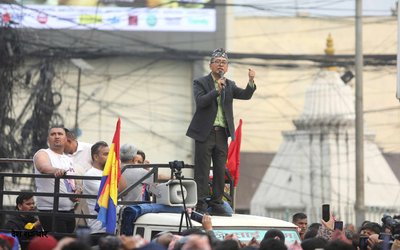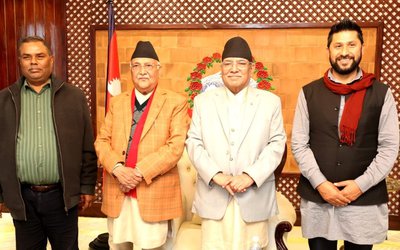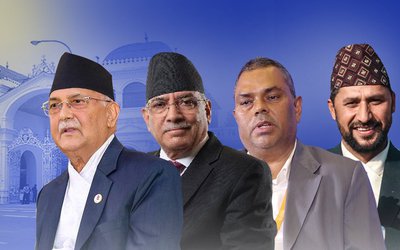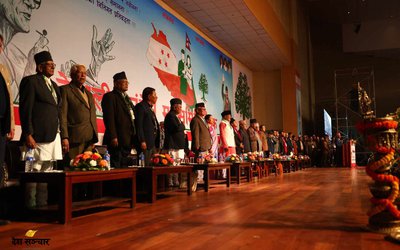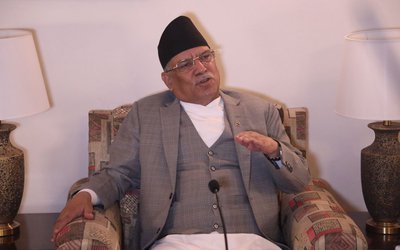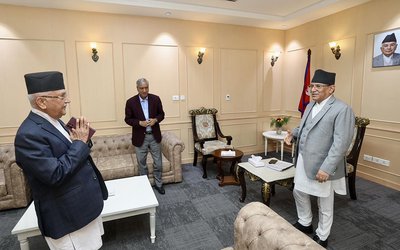Two days after the caretaker prime minister Madhav Kumar Nepal returned home from a much-criticised ten-day foreign sojourn, the main opposition Maoists greeted him with a surprise.
Backed by five fringe parties, the Maoists petitioned president Ram Baran Yadav to convene the special session of parliament which the latter obliged the following day.
The session has been called on December 19. Furious, the prime minister accused the Maoists of seeking a confrontation instead of a consensus.
On their part, the Maoists appear to be trying to shorten the life of the caretaker government.
Said the party’s whip, Jaipuri Gharti, “we want to initiate a fresh process to elect the successor to the incumbent prime minister.”
The Maoist move followed persistent reports of a tacit agreement among the three big parties on heading the government on a rotation, beginning with the only candidate left in the yet-to-be complete election – Ram Chandra Poudel of the Nepali Congress.
There had been speculations that the Maoist party had resigned to the eventual election of Poudel to the top executive office while the so far neutral UML had decided to withdraw its “consensus” mantra and throw its weight behind the Nepali Congress parliamentary party leader to head a majority government.
Sixteen rounds of the elections before the parliament was abruptly prorogued had failed to produce a result. With Maoist chief Pushpa Kamal Dahal ‘Prachanda’ withdrawing after the seventh round, Poudel was the lone candidate left in the fray.
The deadlock over the prime ministerial election however shows little sign of breaking soon.
This has more to do with the intra-party wrangling than with inter-party differences.
The worst affected is the main opposition. It is undergoing one of the worst internal crises following the recent Palungtar plenum, where the hitherto all-powerful chairman Prachanda was openly challenged.
If the first vice chairman Mohan Vaidya ‘Kiran’ is dead against Prachanda making any compromises with other parties, second vice chairman Baburam Bhattarai is now staking claim to replace Prachanda
as the leader of the parliamentary party.
If Bhattarai did succeed it will clear way for him to don the mantle of the office his boss had been desperate to regain.
The UML is a divided house too. Personal egos and ambitions have prevented the top leaders, chairman Jhalnath Khanal, prime minister Madhav Kumar Nepal and the outspoken senior leader K.P.Oli from putting up a common position on the formation of new government.
Even as Nepal and Oli renewed pressures on changing the party’s ‘neutral’ policy on the PM’s election. Khanal remains adamant on his “consensus” stand.
The party’s central committee that began on December 14 was set to break the deadlock and make a new start.
General secretary Iswor Pokharel says, “unless the Maoist party understands the compulsion of Prachanda to support a Congress-led all-party government, the new government with the UML on board could be formed without the Maoist participation in it.”
Any decision is however fraught with the danger of a dramatic development in the party’s future.
The Khanal camp is still harping on what critics dismiss as the ‘outdated consensus’ formula.
The Nepali Congress has put up a relatively united stand. There does not seem to be any difference on the party leading the government.
“We can trust the Maoists to lead the government in the next turn under a rotational basis only when they show real sincerity in implementing the promises to make the peace process work,” said the proposed general secretary, Krishna Prasad Sitaula.
But the Nepali Congress is itself too deeply involved in the disputed nominations for the vice president and the general secretary to make a substantive effort to break the political deadlock besetting the national politics.
The rival camps of president Sushil Koirala and the former prime minister Sher Bahadur Deuba have their priorities set on consolidating their respective positions in the party, rather than on playing a more proactive roles in the broader national spectrum.
Amidst such deep intra-party disputes the special session will find it difficult to offer any solution to the political stalemate, nor will a routine session be any different.
The latest souring of relations between the president and the caretaker prime minister over the former's calling of special session despite the latter's opposition to making what he called a hasty decision will only make the matters worse.
President Ram Baran Yadav had earlier repriminded the prime minister, after he came back from a tiger conference in Russia, over his indulgence in foreign junkets and "indifference" to address crisis at home and advised him to stop going abroad.
se type your tePrime minister Madhav Kumar Nepal ignored the advice and went ahead with his plan to tour Cambodia and Belgium.
Now, the prime minister is peeved that the president did "rush" to act the main opposition's call for a special session of the parliament.
Every new day and every new event are only adding to the complexities in the national politics. They are raising new questions than provide answers to the deepening crisis.
“We can trust the Maoists to lead the government in the next turn under a rotational basis only when they show real sincerity in implementing the promises to make the peace process work,” said the proposed general secretary, Krishna Prasad Sitaula.
But the Nepali Congress is itself too deeply involved in the disputed nominations for the vice president and the general secretary to make a substantive effort to break the political deadlock besetting the national politics.
The rival camps of president Sushil Koirala and the former prime minister Sher Bahadur Deuba have their priorities set on consolidating their respective positions in the party, rather than on playing a more proactive roles in the broader national spectrum.
Amidst such deep intra-party disputes the special session will find it difficult to offer any solution to the political stalemate, nor will a routine session be any different.
The latest souring of relations between the president and the caretaker prime minister over the former's calling of special session despite the latter's opposition to making what he called a hasty decision will only make the matters worse.
President Ram Baran Yadav had earlier repriminded the prime minister, after he came back from a tiger conference in Russia, over his indulgence in foreign junkets and "indifference" to address crisis at home and advised him to stop going abroad.
se type your tePrime minister Madhav Kumar Nepal ignored the advice and went ahead with his plan to tour Cambodia and Belgium.
Now, the prime minister is peeved that the president did "rush" to act the main opposition's call for a special session of the parliament.
Every new day and every new event are only adding to the complexities in the national politics. They are raising new questions than provide answers to the deepening crisis.
- TANAHU HYDROPOWER PROEJCT: A Significant Achievement
- Apr 15, 2024
- AMBASSADOR HANAN GODAR: Sharing Pain With A Nepali Family
- Mar 30, 2024
- VISIT OF KfW AND EIB TO NEPAL : Mission Matters
- Mar 25, 2024
- NEPAL BRITAIN SOCIETY: Pratima Pande's Leadership
- Mar 24, 2024
- NEPAL ARMY DAY: Time To Recall Glory
- Mar 15, 2024

